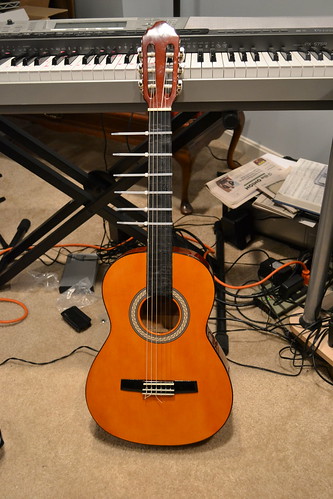December 6, 2011
[2:29]
[ Download ]
Instruments: Valencia 3/4-scale Classical Guitar (modified to Bohlen-Pierce scale), FL Studio 10: Convolver plugin + bass and triangle samples.
For a while, I've been meaning to try composing music in the Bohlen-Pierce scale. Using FL Studio, I had previously been able to modify synthesizers and sample-based instruments to the scale, but since my primary instrument is guitar, I found it difficult to compose using those (somewhat artificial-sounding) keyboard-based instruments.
After running across a video on YouTube showing that you could use zip ties to create temporary frets on a defretted guitar neck, I decided I felt comfortable enough to buy a cheap guitar and perform the operation to turn it into a Bohlen-Pierce guitar.

Note that I chose a 3/4-scale classical guitar, knowing that a) the frets would end up further apart after the operation, and b) nylon strings have a smoother tone, which ought to make the unfamiliar notes of the scale easier to digest.
Having done that, I could now jam on the guitar to come up with Bohlen-Pierce chords and riffs that suited my taste. The present instrumental is my first attempt to bring together chords, a bass line, and a melody into a listenable Bohlen-Pierce track.
Stay tuned for a variation of this track with lyrics!


